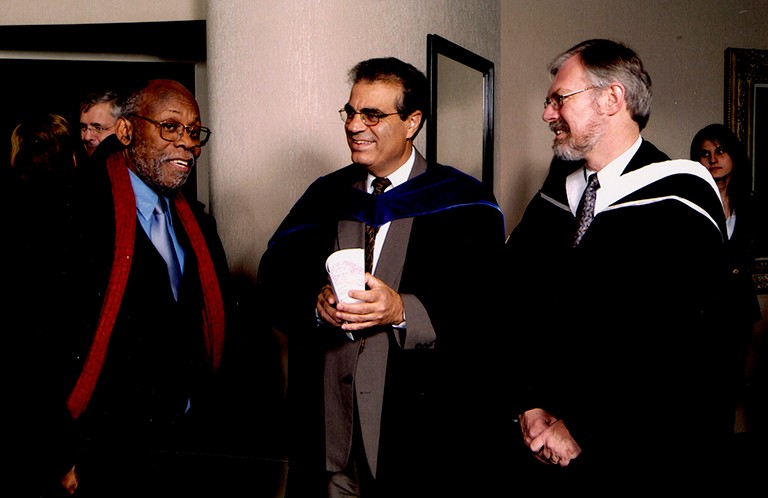Clarence Bayne (1932–2024): ‘It is by our actions that we define ourselves and by our inaction that we allow others to define us’
 Clarence Bayne (far left) continued to speak out against injustice until the end of his life. Item P0083-02-0004, P0083 Clarence Bayne fonds, Concordia University Records Management and Archives.
Clarence Bayne (far left) continued to speak out against injustice until the end of his life. Item P0083-02-0004, P0083 Clarence Bayne fonds, Concordia University Records Management and Archives.
Professor Emeritus Clarence Bayne, a major player in the fight for equality for Montreal’s Black community and a pillar of the city for more than 50 years, died on September 1 at the age of 91.
“Clarence was not only an academic; he was an artist, a Black community stalwart, an innovator, and above all, a loving and caring family man,” says Roland Wills, former associate dean and decision sciences professor in the Faculty of Commerce and Administration, now the John Molson School of Business.
Bayne came to Sir George Williams University, one of Concordia’s founding institutions, in 1966 after completing his master's and PhD at McGill University. He spent 50 years with the John Molson School before retiring in 2016. During his career, he taught statistics, quantitative methods and decision sciences. He became full professor in 2001 and was the director of the Diploma in Administration/Diploma in Sport Administration program from 1991 to 2006. His research focused on the social, political, economic and institutional life and development of marginalized communities in Quebec.
Anne-Marie Croteau, dean of the John Molson School, remembers meeting Bayne when she started teaching at the former Faculty of Commerce and Administration in 1997. She recalls how welcoming, positive and encouraging he was of her as she navigated life as an early-career academic.
“I saw him standing up for others, including me,” Croteau says. “His thoughtfulness and consideration for others will always be remembered.”
Born in the Republic of Trinidad and Tobago, Bayne came to Canada in 1955 and settled in Montreal in 1964. At the time, Caribbeans in Canada faced significant discrimination and other forms of racism. Policies by the Canadian government to ban Black immigrants in the early 20th century as well as political and economic conditions between Canada and Anglo-Caribbean colonies created long-lasting racial bias.
Bayne’s own experiences of anti-Black racism in Montreal motivated him to organize for change across the country.
 Clarence Bayne at the podium during a Convocation ceremony in the 2000s. Item P0083-02-0003, P0083 Clarence Bayne fonds, Concordia University Records Management and Archives.
Clarence Bayne at the podium during a Convocation ceremony in the 2000s. Item P0083-02-0003, P0083 Clarence Bayne fonds, Concordia University Records Management and Archives.
‘His contributions were immense’
In October 1968, the Canadian Conference Committee, of which Bayne was president, organized the conference, “Problems of Involvement in the Canadian Society with Reference to Black People.” This would be a pivotal moment for the Black community in Canada, as outlined in The Road to Now: A History of Blacks in Montreal (Véhicule Press, 1997) by Dorothy Williams, BA 84, historian, author and alumna of Concordia’s School of Community and Public Affairs.
Just one year later, against the backdrop of the civil rights and Black Power movements in the United States, students occupied the computer centre at Sir George Williams University to protest institutional racism.
“There was already an incredible revolution in spirit underway, a political and social revolution in Black societies throughout Africa and throughout the Black diaspora,” Bayne said in a 2014 Concordia news article.
In the early 1990s, Bayne and other Black community leaders petitioned Montreal mayor Jean Doré to institute Black History Month.
In addition, Bayne was involved with the Black Community Council of Quebec and served as a board member for the Quebec Board of Black Educators, the Quebec Community Group Network, the Queen Elizabeth Health Complex, and the Black Studies Centre. He was co-founder and former executive director of the Black Theatre Workshop and was an active member of the Board of Directors until his death. He was also president of the Black Community Resource Centre and worked with community leaders to create the Monkland Community Centre.
Among his many honours are the Governor General’s Award for the Arts and the Black Theatre Workshop’s Martin Luther King Jr. Award.
In 2020 and in 2023, Bayne gifted Concordia with donations of archival materials documenting his lifelong work, including teaching and research records and documents related to his involvement in Concordia University administration, as well as materials related to his extensive work with local organizations. The fonds also includes manuscripts (Bayne was a published poet), personal correspondence and some photographs.
“His contributions to the Black community in Canada are immense," says Wills, noting that Bayne was the architect of Canada's contribution to the Second World Black and African Festival of Arts and Culture in Lagos, Nigeria.
Bayne continued to speak out against injustice until the end of his life, supporting the global protests against systemic racism and police violence that stemmed from George Floyd’s murder in 2020.
This spirit is captured in an excerpt from an address he gave to the Trinidad and Tobago Association of Montreal in 1985: “It is by our actions that we define ourselves and by our inaction that we allow others to define us.”
“Clarence may be gone, but his legacy lives on, not only in the vast number of students he taught at the university, but also in the positive changes he effectively contributed to Quebec and Canadian society in general,” Wills adds.




